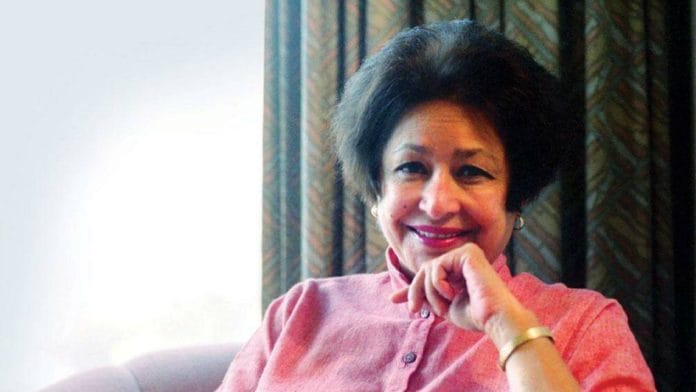New Delhi: As a nine-year old, Bapsi Sidhwa was on her way to her private tutor in Lahore’s Warris Road when she saw a gardener kick a gunny sack, from which popped ‘a dead body of a very good looking man’. The memory of the dead body would feature in one of her most acclaimed 1978 novels, The Crow Eaters. As one of Pakistan’s most celebrated authors, writing, for Sidhwa, was not just an act of expression but a way to make sense of her own experiences and the larger social and political turmoil she witnessed.
Sidhwa, known for her compelling portrayals of South Asian life, especially as a Parsi, and the impact of Partition, passed away at the age of 86 on 24 December in Houston. She leaves behind a body of work that remains pivotal in world literature, most notably The Crow Eaters (1978) and Ice-Candy Man (1988), later retitled Cracking India.
In Pakistan, where censorship often stifled free expression, Sidhwa was acutely aware of the delicate balance between voicing truths and navigating the boundaries imposed by the state and society.
“When these fundamentalist fanatics get agitated, nobody can control them. In Pakistan, everybody exercises a sort of self-censorship,” she said in an interview with David Montenegro.
Though Sidhwa spoke Gujarati and Urdu at home, she chose English as her language of creative expression, crafting works that resonate across cultures—also because she believed that the “English don’t have a monopoly on the language” and in Pakistan ‘‘one can get away with writing in English what you can’t writing in Urdu.”
Pakistani politician Khurram Dastgir noted this in his tribute to her: “She claimed English as an authentic Pakistani language.”
Living as a Parsi in Pakistan
Her debut novel, The Crow Eaters, was groundbreaking in its portrayal of the Parsi community in Pakistan. In 2022, BBC in its list of jubilee reads called it “wickedly funny and brutally honest, offering a vibrant portrayal of a Parsi family finding its footing in colonial India at the dawn of the 20th century”.
However, the book, which humorously chronicled the life of a Parsi businessman, was met with significant backlash within the community. The Parsi elders, who saw themselves as a noble and charitable people, felt that Sidhwa had revealed private aspects of their lives and traditions, damaging their carefully curated public image. The launch of the book was so controversial that a bomb threat was made at its launch in Lahore.
It was Ice-Candy-Man (1988) that marked a significant shift in her literary focus. The preface to the book—‘all wars are fought on women’s bodies’ moved Indian filmmaker Deepa Mehta so much that she reached out to Bapsi for its film adaptation. When Mehta asked her if she wanted any specific changes, the author said, “Go write the script. Make it your own.”
A documentary about her life, Bapsi: Silences of My Life, released in October 2022, explores her journey as a writer, shaped profoundly by her experiences during the Partition of India. Her accolades included Pakistan’s highest arts honor, the Sitara-i-Imtiaz (1991), the Mondello Prize (2007), and induction into the Zoroastrian Hall of Fame. The Bapsi Sidhwa Literary Prize was also established in her honour by the Zoroastrian Association of Houston.
“Bapsi was exactly the sort of woman who could laugh at herself—and she often did. Her works were studies of human foibles, but equally displayed the resilience of human spirit,” Mehta wrote in her tribute to Bapsi.
Also read: Pakistan defence minister’s latest headache is Operation Goldsmith—‘campaign to free Imran’
Reclaiming Pakistan
In her lifetime, it was her aim to highlight the lived experiences of Pakistanis, beyond the Western gaze. Her writing, in this way, became an act of reclamation—not just for the stories of women or the marginalised, but for the dignity and self-esteem of an entire nation.
She noted in the 1991 interview: “It’s been fashionable to kick Pakistan, and it’s been done again and again by various writers living in the West. And I feel, if there’s one little thing I could do, it’s to make people realise: We are not worthless because we inhabit a poor country or because we inhabit a country which is seen by Western eyes as a primitive, fundamentalist country only … I mean, we are a rich mixture of all sorts of forces as well, and our lives are very much worth living.”
(Edited by Prasanna Bachchhav)







Ms. Bapsi desperately needed a Ghar Wapsi.